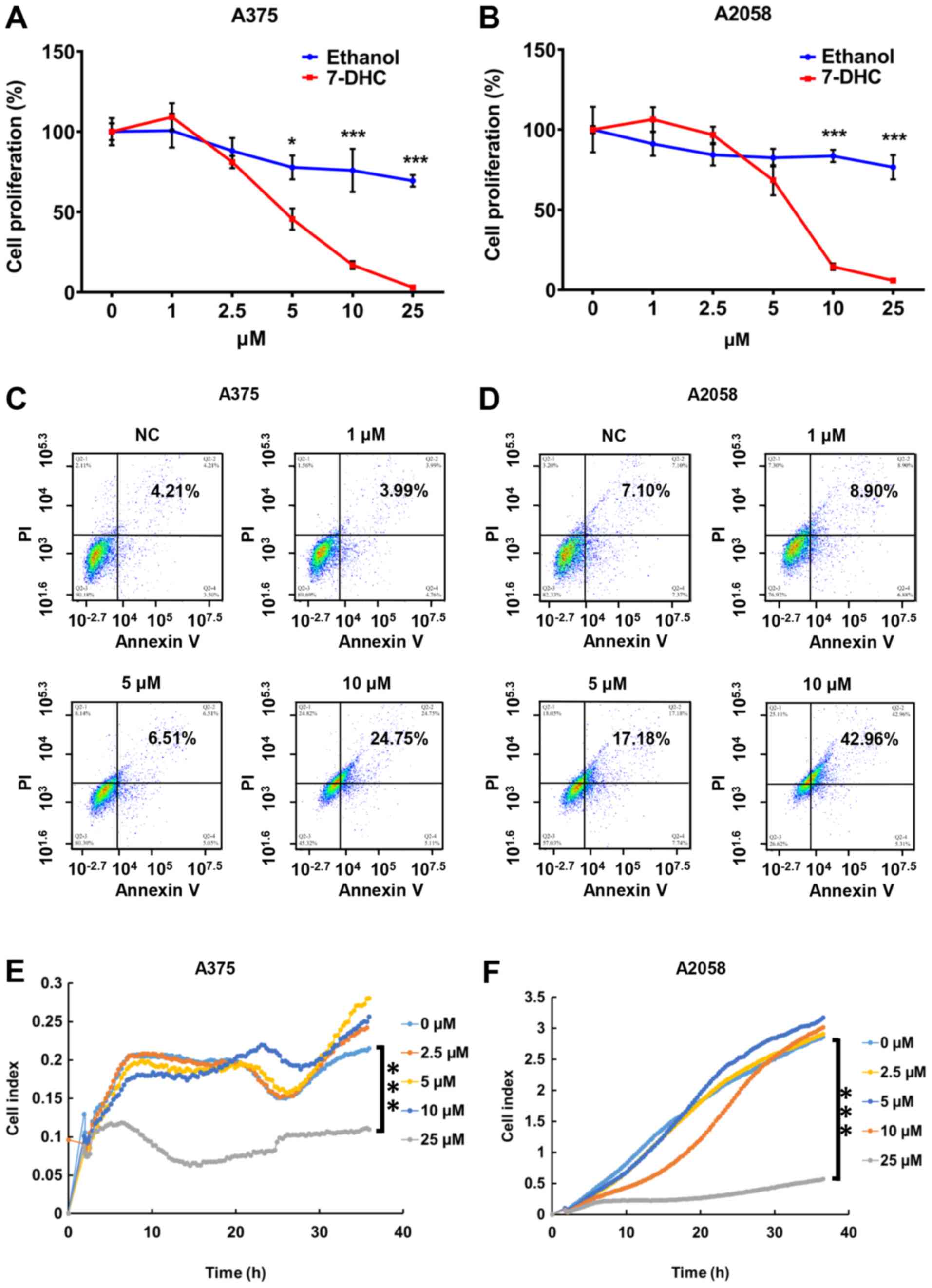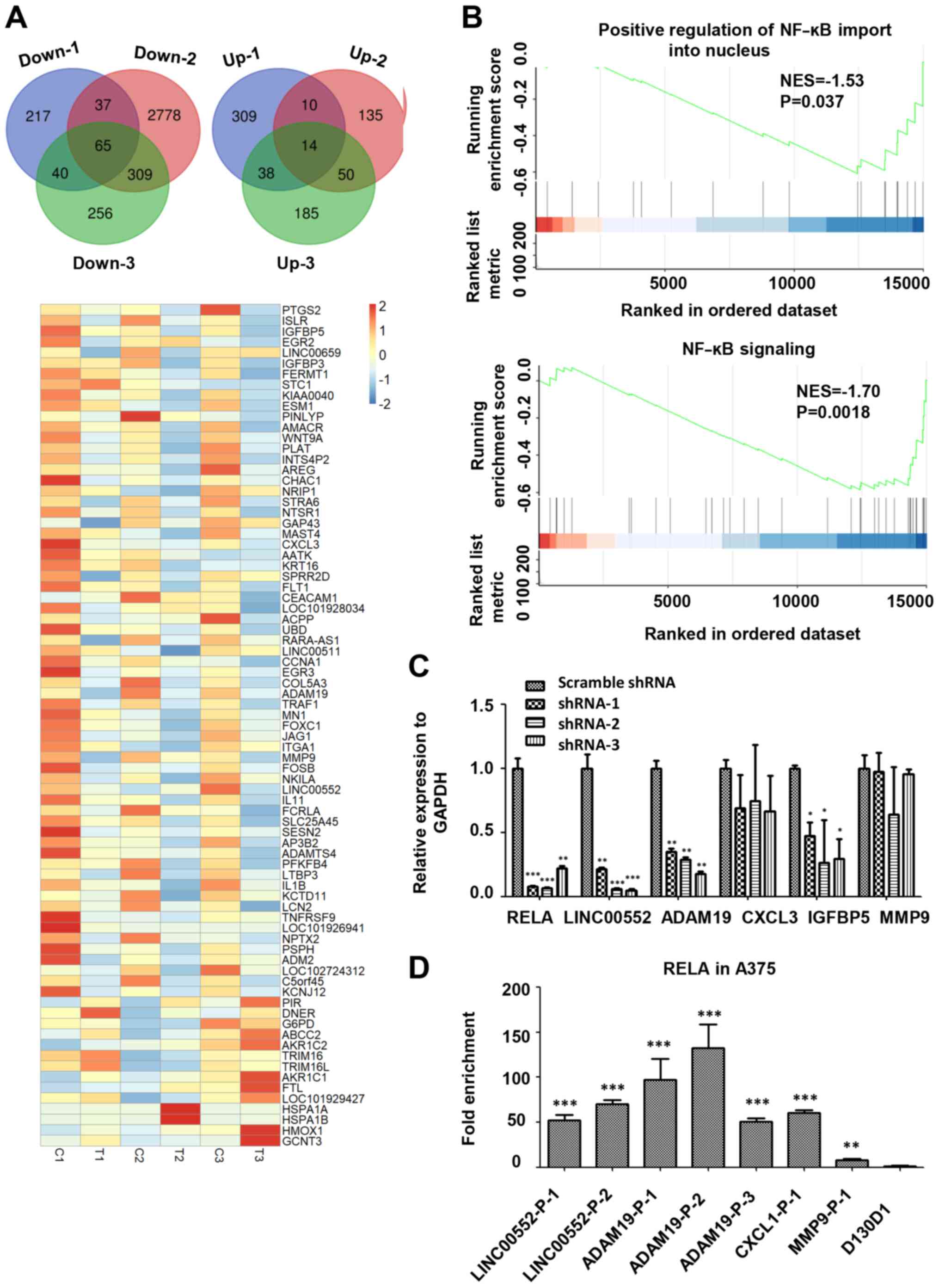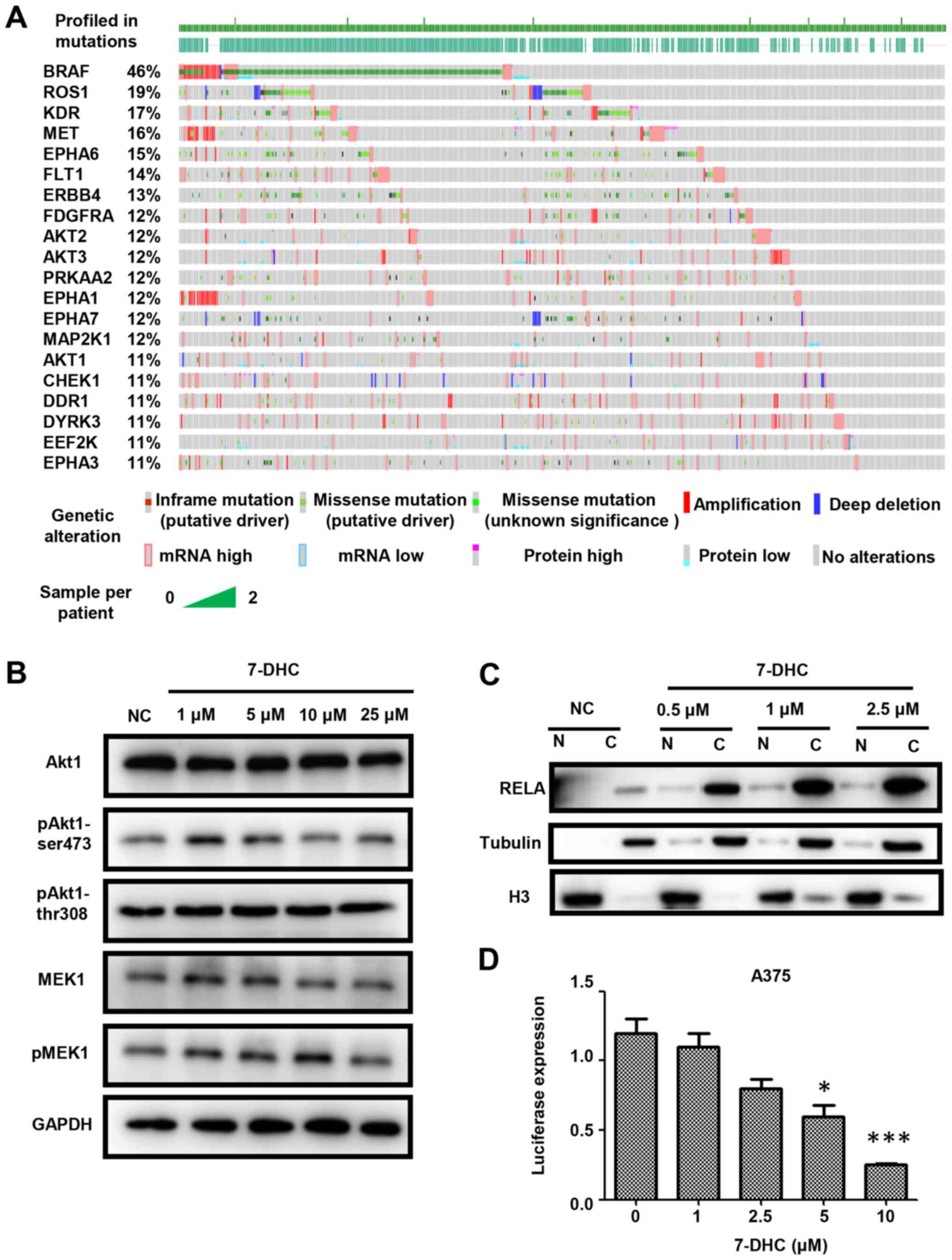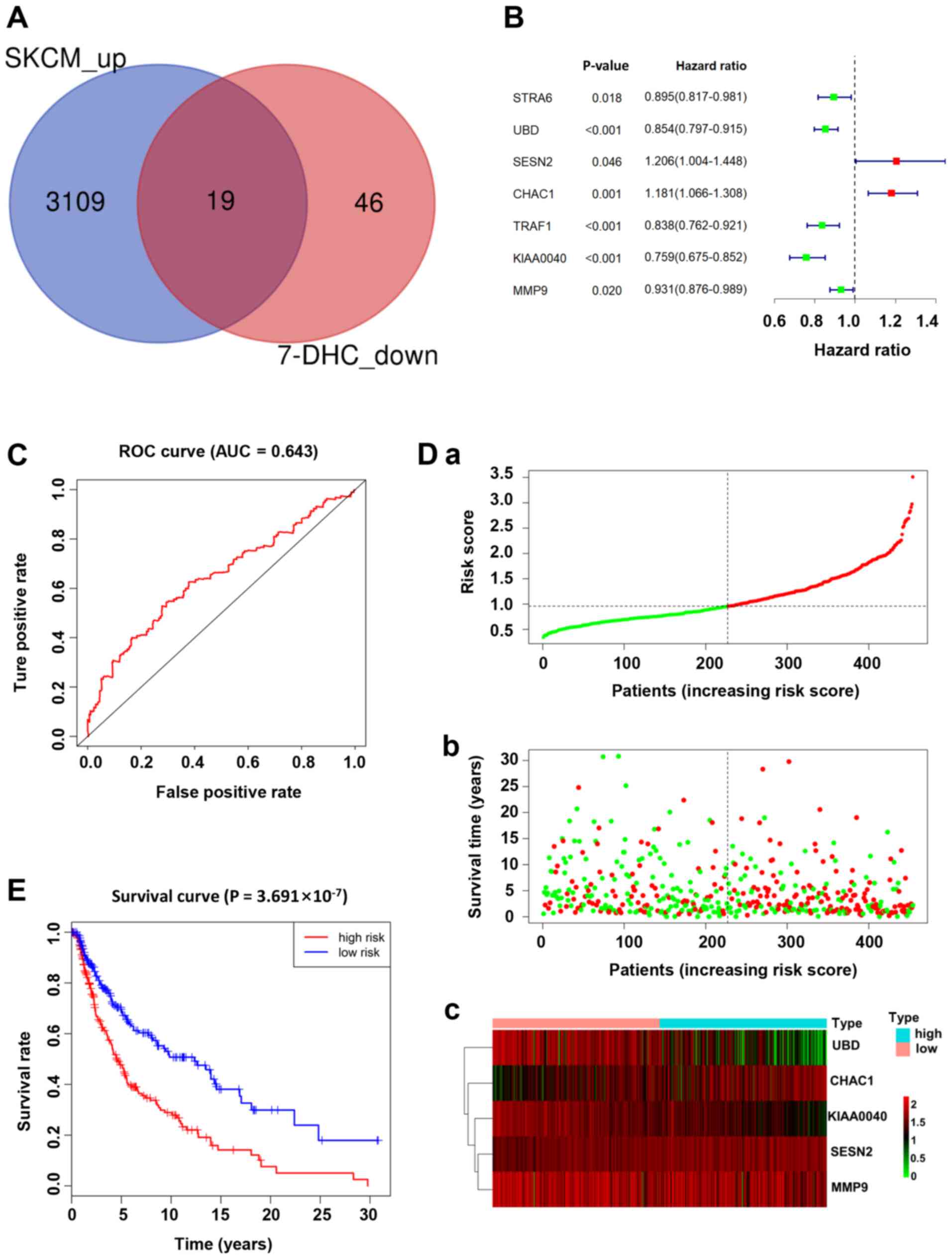|
1
|
Schadendorf D, van Akkooi ACJ, Berking C,
Griewank KG, Gutzmer R, Hauschild A, Stang A, Roesch A and Ugurel
S: Melanoma. Lancet. 392:971–984. 2018. View Article : Google Scholar : PubMed/NCBI
|
|
2
|
Ferlay J, Soerjomataram I, Dikshit R, Eser
S, Mathers C, Rebelo M, Parkin DM, Forman D and Bray F: Cancer
incidence and mortality worldwide: Sources, methods and major
patterns in GLOBOCAN 2012. Int J Cancer. 136:E359–E386. 2015.
View Article : Google Scholar : PubMed/NCBI
|
|
3
|
Leong SP, Mihm MC Jr, Murphy GF, Hoon DS,
Kashani-Sabet M, Agarwala SS, Zager JS, Hauschild A, Sondak VK,
Guild V and Kirkwood JM: Progression of cutaneous melanoma:
Implications for treatment. Clin Exp Metastas. 29:775–796. 2012.
View Article : Google Scholar
|
|
4
|
Crocetti E, Mallone S, Robsahm TE, Gavin
A, Agius D, Ardanaz E, Lopez MC, Innos K, Minicozzi P, Borgognoni
L, et al: Survival of patients with skin melanoma in Europe
increases further: Results of the EUROCARE-5 study. Eur J Cancer.
51:2179–2190. 2015. View Article : Google Scholar : PubMed/NCBI
|
|
5
|
Whiteman DC, Pavan WJ and Bastian BC: The
melanomas: A synthesis of epidemiological, clinical,
histopathological, genetic, and biological aspects, supporting
distinct subtypes, causal pathways, and cells of origin. Pigment
Cell Melanoma Res. 24:879–897. 2011. View Article : Google Scholar : PubMed/NCBI
|
|
6
|
Pennello G, Devesa S and Gail M:
Association of surface ultraviolet B radiation levels with melanoma
and nonmelanoma skin cancer in United States blacks. Cancer
Epidemiol Biomarkers Prev. 9:291–297. 2000.PubMed/NCBI
|
|
7
|
Rodriguez-Cerdeira C, Gregorio MC,
López-Barcenas A, Sánchez-Blanco E, Sánchez-Blanco B, Fabbrocini G,
Bardhi B, Sinani A and Guzman RA: Advances in immunotherapy for
melanoma: A comprehensive review. Mediators Inflamm.
2017:32642172017. View Article : Google Scholar : PubMed/NCBI
|
|
8
|
Shain AH, Yeh I, Kovalyshyn I, Sriharan A,
Talevich E, Gagnon A, Dummer R, North J, Pincus L, Ruben B, et al:
The genetic evolution of melanoma from precursor lesions. N Engl J
Med. 373:1926–1936. 2015. View Article : Google Scholar : PubMed/NCBI
|
|
9
|
Guo D, Lui GYL, Lai SL, Wilmott JS, Tikoo
S, Jackett LA, Quek C, Brown DL, Sharp DM, Kwan RYQ, et al: RAB27A
promotes melanoma cell invasion and metastasis via regulation of
pro-invasive exosomes. Int J Cancer. 144:3070–3085. 2019.
View Article : Google Scholar : PubMed/NCBI
|
|
10
|
Michielin O, van Akkooi ACJ, Ascierto PA,
Dummer R and Keilholz U; ESMO Guidelines Committee. Electronic
address, : clinicalguidelines@esmo.org: Cutaneous melanoma: ESMO
clinical practice guidelines for diagnosis, treatment and
follow-up†. Ann Oncol. 30:1884–1901. 2019. View Article : Google Scholar : PubMed/NCBI
|
|
11
|
Duggan MA, Anderson WF, Altekruse S,
Penberthy L and Sherman ME: The surveillance, epidemiology, and end
results (SEER) program and pathology: Toward strengthening the
critical relationship. Am J Surg Pathol. 40:e94–e102. 2016.
View Article : Google Scholar : PubMed/NCBI
|
|
12
|
Flaherty KT: Narrative review: BRAF opens
the door for therapeutic advances in melanoma. Ann Intern Med.
153:587–591. 2010. View Article : Google Scholar : PubMed/NCBI
|
|
13
|
Menzies AM and Long GV: Systemic treatment
for BRAF-mutant melanoma: Where do we go next? Lancet Oncol.
15:E371–E381. 2014. View Article : Google Scholar : PubMed/NCBI
|
|
14
|
Korman JB and Fisher DE: Developing
melanoma therapeutics: Overview and update. Wiley Interdiscip Rev
Syst Biol Med. 5:257–271. 2013. View Article : Google Scholar : PubMed/NCBI
|
|
15
|
Prabhu AV, Luu W, Sharpe LJ and Brown AJ:
Cholesterol-mediated degradation of 7-dehydrocholesterol reductase
switches the balance from cholesterol to vitamin D synthesis. J
Biol Chem. 291:8363–8373. 2016. View Article : Google Scholar : PubMed/NCBI
|
|
16
|
Piotrowska A, Wierzbicka J and Żmijewski
MA: Vitamin D in the skin physiology and pathology. Acta Biochim
Pol. 63:17–29. 2016. View Article : Google Scholar : PubMed/NCBI
|
|
17
|
Xiao J, Li W, Zheng X, Qi L, Wang H, Zhang
C, Wan X, Zheng Y, Zhong R, Zhou X, et al: Targeting
7-dehydrocholesterol reductase integrates cholesterol metabolism
and IRF3 activation to eliminate infection. Immunity.
52:109–122.e6. 2020. View Article : Google Scholar : PubMed/NCBI
|
|
18
|
Wang Y, Tian N, Li C, Hou Y, Wang X and
Zhou Q: Incorporation of 7-dehydrocholesterol into liposomes as a
simple, universal and efficient way to enhance anticancer activity
by combining PDT and photoactivated chemotherapy. Chem Commun
(Camb). 55:14081–14084. 2019. View Article : Google Scholar : PubMed/NCBI
|
|
19
|
Tian NN, Li C, Tian N, Zhou QX, Hou YJ,
Zhang BW and Wang XS: Syntheses of 7-dehydrocholesterol peroxides
and their improved anticancer activity and selectivity over
ergosterol peroxide†. New J Chem. 41:14843–14846. 2017.
View Article : Google Scholar
|
|
20
|
Gelzo M, Granato G, Albano F, Arcucci A,
Dello Russo A, De Vendittis E, Ruocco MR and Corso G: Evaluation of
cytotoxic effects of 7-dehydrocholesterol on melanoma cells. Free
Radical Bio Med. 70:129–140. 2014. View Article : Google Scholar
|
|
21
|
Livak KJ and Schmittgen TD: Analysis of
relative gene expression data using real-time quantitative PCR and
the 2(-Delta Delta C(T)) method. Methods. 25:402–408. 2001.
View Article : Google Scholar : PubMed/NCBI
|
|
22
|
Yu G, Wang LG, Han Y and He QY:
clusterProfiler: An R package for comparing biological themes among
gene clusters. OMICS. 16:284–287. 2012. View Article : Google Scholar : PubMed/NCBI
|
|
23
|
Chistiakov DA and Chekhonin VP:
Circulating tumor cells and their advances to promote cancer
metastasis and relapse, with focus on glioblastoma multiforme. Exp
Mol Pathol. 105:166–174. 2018. View Article : Google Scholar : PubMed/NCBI
|
|
24
|
Kaltschmidt B, Greiner JFW, Kadhim HM and
Kaltschmidt C: Subunit-specific role of NF-κB in cancer.
Biomedicines. 6:442018. View Article : Google Scholar
|
|
25
|
Hinz N and Jücker M: Distinct functions of
AKT isoforms in breast cancer: A comprehensive review. Cell Commun
Signal. 17:1542019. View Article : Google Scholar : PubMed/NCBI
|
|
26
|
Wise HM, Hermida MA and Leslie NR:
Prostate cancer, PI3K, PTEN and prognosis. Clin Sci (Lond).
131:197–210. 2017. View Article : Google Scholar : PubMed/NCBI
|
|
27
|
Tilborghs S, Corthouts J, Verhoeven Y,
Arias D, Rolfo C, Trinh XB and van Dam PA: The role of nuclear
factor-kappa B signaling in human cervical cancer. Crit Rev Oncol
Hematol. 120:141–150. 2017. View Article : Google Scholar : PubMed/NCBI
|
|
28
|
Atefi M, Avramis E, Lassen A, Wong DJ,
Robert L, Foulad D, Cerniglia M, Titz B, Chodon T, Graeber TG, et
al: Effects of MAPK and PI3K pathways on PD-L1 expression in
melanoma. Clin Cancer Res. 20:3446–3457. 2014. View Article : Google Scholar : PubMed/NCBI
|
|
29
|
Silvente-Poirot S and Poirot M: Cancer.
Cholesterol and cancer, in the balance. Science. 343:1445–1446.
2014. View Article : Google Scholar : PubMed/NCBI
|
|
30
|
Moutzouri E, Elisaf M and Liberopoulos EN:
Hypocholesterolemia. Curr Vasc Pharmacol. 9:200–212. 2011.
View Article : Google Scholar : PubMed/NCBI
|
|
31
|
Bentz MH and Magnette J:
Hypocholesterolemia in the acute phase of inflammation during
sepsis. Rev Med Int. 19:168–172. 1998. View Article : Google Scholar
|
|
32
|
Mokdad AH, Bowman BA, Ford ES, Vinicor F,
Marks JS and Koplan JP: The continuing epidemics of obesity and
diabetes in the United States. JAMA. 286:1195–1200. 2001.
View Article : Google Scholar : PubMed/NCBI
|
|
33
|
de Medina P, Paillasse MR, Segala G,
Voisin M, Mhamdi L, Dalenc F, Lacroix-Triki M, Filleron T, Pont F,
Saati TA, et al: Dendrogenin A arises from cholesterol and
histamine metabolism and shows cell differentiation and anti-tumour
properties. Nat Commun. 4:18402013. View Article : Google Scholar : PubMed/NCBI
|
|
34
|
Wu Q, Ishikawa T, Sirianni R, Tang H,
McDonald JG, Yuhanna IS, Thompson B, Girard L, Mineo C, Brekken RA,
et al: 27-Hydroxycholesterol promotes cell-autonomous, ER-positive
breast cancer growth. Cell Rep. 5:637–645. 2013. View Article : Google Scholar : PubMed/NCBI
|


















